Ever since early 2012, South Sudan’s imminent economic collapse has been routinely predicted. Impressions from a recent visit to Juba indicate that this time around it might be more to these divinations than before. The economic crisis is compounded by a de facto break-down in peace negotiations and South Sudan faces a formidable threat to… Read more »
A Climate of Conflicts?
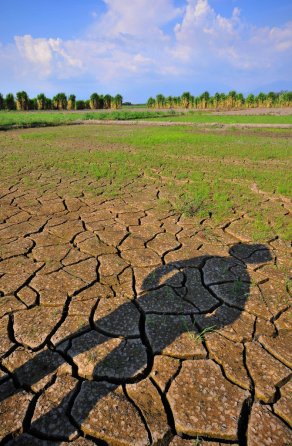
Photo: Neil Palmer (CIAT)
Political violence correlates strongly with climate: Civil conflict risk is seven to ten times higher in dry and tropical climates than in continental climate zones. Yet, there is little evidence that climatic variability and change are important in understanding this pattern. The prospect of climate change causing forced migration and food and economic insecurity, meanwhile, raises new concerns about possible future conflict scenarios.
- Climate change is not likely to have a common and universal effect on armed conflict risk.
- Indirect effects of climate on conflict may work via migration, food insecurity or economic shocks.
- Many of the factors that increase conflict risk also make societies vulnerable to climate change.
- Investing in climate change adaptation is likely to have significant, positive security implications.
Read more in a recent Policy Brief from the Conflict Trends Project at PRIO.
Therapeutic Prosecutions?
Assessing the therapeutic potential of criminal prosecution of international crimes at the International Criminal Court (ICC).
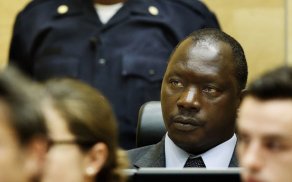
In 2012, the International Criminal Court (ICC) handed out its first-ever prison sentence, giving a 14-year jail term to former Congolese warlord Thomas Lubanga.
Over the past twenty years, the global community has shown a renewed commitment to the pursuit of international criminal justice. A hallmark development in this regard is the establishment of the permanent International Criminal Court (ICC). A central asset of the court is victim and witness participation, based on an assumption that this approach will benefit those who have been affected by the crimes and their communities. In a recent policy brief we explore the therapeutic potential and pitfalls of this approach based on a literature review, relevant studies in the field and initial interviews at the ICC.
- A sense of confidence in the system and a feeling of security are vital in order for the ICC to have a positive impact on victims and their communities.
- The possibility of reparation is important, but can also have adverse effects if perceived as a way of silencing victim’s accounts.
- The court process may represent a form of social recognition and acknowledgement of what happened which has an important healing potential.
Read more in a recent Policy Brief from PRIO.
Putin’s Political Pause Amid National Mobilization
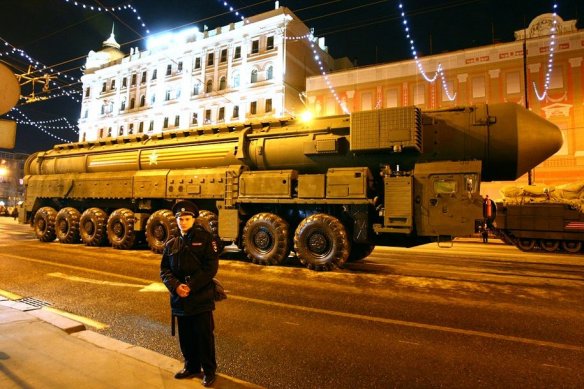
XXL-missiles are again rolling on Moscow streets. Photo Novaya gazeta.
The focal point for the “patriotic” propaganda for the last several months has been the celebration of the 70th anniversary of the Soviet Union’s victory in the Great Patriotic War (as World War II is known in Russia), which is now just a few days away. Reflections on the horrible costs of that bitter victory or on coalition efforts with the Allies have been nearly nonexistent; instead, jingoistic triumphalism, combined with the traditional display of military might, translates into an eager anticipation of yet another victorious campaign. Putin has invested a lot of personal effort in turning this celebration into a demonstration of Russia’s prominent position in the international arena, and now has to swallow not only the fruits of isolation but also the consequences of progressing economic feebleness. The artificially induced moment of national unity will likely dissipate with unpredictable speed in the weeks to come, so his window for a new morale-boosting aggressive action may turn out to be quite narrow.
This is the final point from the article in Eurasia Daily Monitor, May 4.
Humanitarianism and Return
Humanitarianism and Return: Compromising Protection
In many contexts around the world, states use funding for humanitarian programming as an active part of their attempts to manage populations displaced by conflict. Humanitarian aid to refugees and internally displaced is commonly understood as a temporary activity that ends when people will return home. Yet returnees can often not be provided with protection and ‘return’ for many entails a first encounter with a new place. In a recent policy brief we argue that humanitarian organizations have the responsibility to analyze the long-term security implications of their decisions on where to provide aid.
-
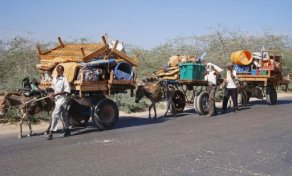
Somali refugees returning. Photo: The Africa Migration Insider
Return of refugees is a common aim of humanitarian policies in (post-) conflict contexts.
- For a portion of refugees, ‘return’ entails a first encounter with a new place, while many others have lost social networks in places of origin.
- To guarantee protection, programming for returnees requires mobile forms of assistance that build on social networks.
- If return programming is considered, humanitarian actors should include a systematic analysis of its long-term security impact.
Read more in a recent Policy Brief from PRIO
This Week in South Sudan – April 20-28
Monday 20 April The SPLM (IO) conference in Pagak was kicked off, the agenda is to discuss the status of the peace negotiations, and the proposed IGAD +. President Kiir’s address at the opening of the national assembly was met with mixed reactions from its members. Tuesday 21 April President Kiir has once again asked… Read more »
Patterns of Peacemaking
When do we see international mediation, and what are the impacts?
International mediation is a form of diplomatic intervention aimed at reaching negotiated solutions to armed conflict, political violence and international crises. Used by states, organizations, groups or individuals, mediation continues to be an important form of peacemaking. We outline the major trends in international mediation, identify relevant empirical trends and discuss implications for policy.
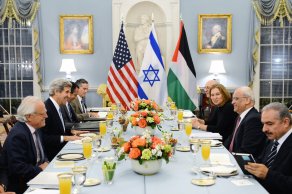
Photo: U.S. Department of State/flickr.
- Mediation increases the likelihood of short-term peaceful settlement of conflicts.
- While international mediation has become increasingly common, many conflicts are still unmediated.
- The distribution of mediation is globally skewed, with Europe and the Middle East attracting the most attention.
- States and the UN remain key mediators, but regional organizations are becoming increasingly active and competent.
- There is no evidence of a positive long-term effect of international mediation.
Read more in a recent Policy Brief from the Conflict Trends project at PRIO.
Earthquake in Nepal and we are Safe
Peace researchers often have the opportunity to witness the ‘real world’ of conflict and post-conflict during fieldwork in countries such as Nepal. In some cases we also cooperate with local institutions where we benefit from working with fellow peace researchers and other partners. In Nepal we have had the great pleasure of working with Dr. Bishnu Raj Upreti, director of the Nepal Centre for Contemporary Research (NCCR) on a collaborative project called Making Women Count for Peace.
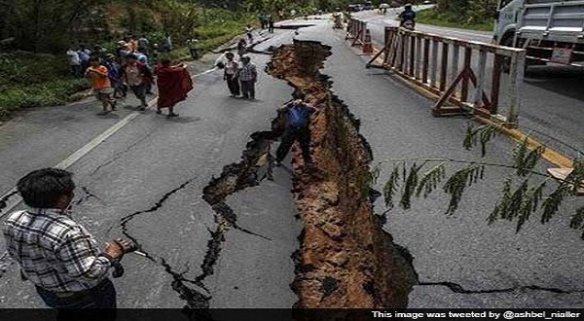
This image was tweeted 25 April by @ashbel_nialler
When the 7.8-magnitude earthquake hit Nepal’s capital Kathmandu and its surrounding areas on Saturday, our first thoughts naturally went to Bishnu, his colleagues and their families. After initial messages that they were unharmed by the earthquake and the numerous aftershocks, we received the following update from Bishnu this morning:
Read More
Recognising and Denying Armenian Losses in Cyprus
Cyprus was one of the first countries to recognise the Armenian genocide, but the relationship that the country has with its own Armenian population is more complicated than it seems.
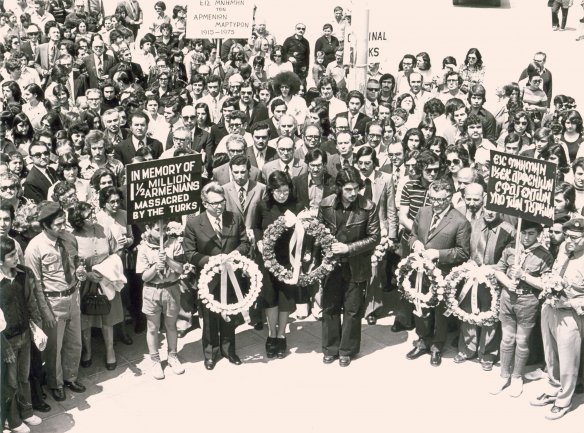
First Armenian Genocide march at Eleftheria square in Nicosia (1975). Wikimedia Commons
The centenary of the Armenian Genocide on 24 April this year comes amidst heightened speculation about a resumption of peace negotiations between Greek and Turkish Cypriots. The timing is coincidental and yet it is telling of how, in Cyprus, the Armenian issue (more so than others) has been mired in the Greco Turkish dispute.
Comics and the Liberation from Patriarchy
New media, new content
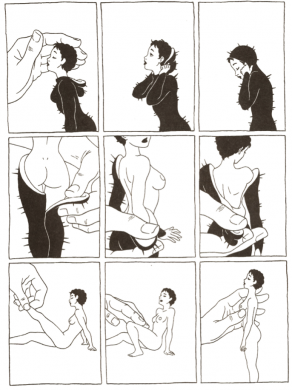
Reem: “Thorn,” Tuk-Tuk 7, pp. 37. Tuk-Tuk is a bi-monthly independent magazine run by a collective of young artists.
Warning: This is all work in progress, so it leaves much to be desired. But this subject is so fun working on that I wanted to share what I have even if it is still pretty undeveloped. OK, here goes:
During the last few years, the literary scene in Egypt has been enriched by a new kind of medium: Comics for grown-ups. Arab comics for grown-ups is a new cultural phenomenon which is only now beginning to attract attention, not least thanks to the efforts of Marcia Lynx Qualey, and it provides a rich, fun and stimulating window into contemporary Arab culture. In the course of a few years, we have seen manga-inspired horror stories, crime noir set in Cairo, and anthologies with stories ranging from the funny and surreal to deeply disturbing accounts of poverty and oppression. The most visible venue for the new comics is Tuk-Tuk, a bi-monthly independent magazine run by a collective of young artists.
Read More